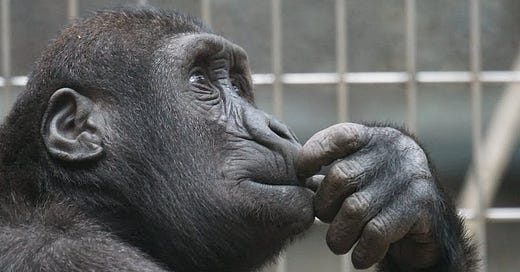The human connection with other animals has always intrigued me. How do we communicate with them? Why do we seem to need them endlessly, but they don’t need us in the same way? And perhaps most importantly, why do we hurt them, steal their body parts and eat them if they are really a part of us, if we came from them?
I learned to read by reading about animals, and I wept over books written about creatures of all kinds, particularly when the animals told their own stories, like Bambi, Beautiful Joe and Black Beauty. Each of these creatures, in case you don’t remember, a fawn, dog and horse, suffered at the hands of humans and lived to talk about it.
What person, unless made of stone, didn’t cry over Born Free, The Call of the Wild, the entire “Lassie” film archive and television shows, the “Black Stallion” novel series and its companion film, The Black Stallion, the stunning movie directed by Francis Coppola that’s currently on my DVR?
And who would have thought a series of comedies, movies starring a talking mule named Francis, and a TV sitcom whose central character is a talking horse named Mr. Ed would be so popular? Humans seem endlessly fascinated with the animal mind, but despite reams of scientific research focused on animal cognition, the only way we can attempt to understand their minds is to anthropomorphize them and pretend they communicate like we do.
If you want to read a couple of humorous takes on what other animals have to say about humans, look no further than these two pieces from The NewYorker: Here’s the running of the Kentucky Derby from the horses’ perspective; and a behind-the-scenes look at Leo DiCaprio and the filming of The Revenant from its top paid star, the Bear.
In a more serious vein, I’ve gathered a few extraordinary articles about humans’ relationship with other animals to help explore why we seem to need them, love them, communicate with them, and are so much poorer when they are absent from our lives.
— First up is an article from The New York Times Magazine titled, “Why We Take Animal Voyages” by Sam Anderson. It is a masterpiece of beautiful writing and a uniquely researched commentary on the intensity of the human-animal bond.
AN ANIMAL VOYAGE is special because it requires us to make many journeys all at once. To really connect with another creature, you have to cross multiple kinds of distance: physical, spiritual, temporal. You have to leave our daily sense of clock time and reach into something like evolutionary time. You have to stare across vast chasms of consciousness. Look into the eye of a bison, a marlin, a parrot, an iguana. What is the gulf between your mind and theirs? That space can’t be measured in miles or light years or any other unit we can name. It will probably never be definitively crossed. What kind of bridge would ever even begin to work? And so an animal voyage is, on some level, always destined to fail. This, too, is part of its appeal.
— This is a NPR interview on the program Fresh Air in which the Pulitzer prize-winning science writer, Ed Yong, discusses the vast array of sensory perceptions that other animals have of our shared physical world, that we will never be able to access.
The colors of flowers have evolved to ideally tickle the eyes of bees…It means that beauty as we know it, is not only in the eye of the beholder, it arises because of that eye.
— And finally for this evening, a beautiful story of a 30+ year relationship between a woman and a horse named Rush, from The New York Times sports writer, Mike Wilson. The owner of Rush, Bridget Eukers, received the horse as a present from her parents when she was in her early teens. They competed together, rode together and spent their lives together. When he died over 30 years later at 39 years and 188 days, he was “possibly the longest lived thoroughbred horse in the United States.”
…his [Rush’s] death marked the end of a 30-year partnership — Eukers’s word — with horse and owner showing a level of dedication to each other that would be extraordinary for any two beings, equine or human. “He would fight for me, and I would fight for him,” Eukers said.
Let me know what you think of the human-animal bond. Do you believe we need them for our survival? What are your experiences “voyaging” with animals? Feel free to leave your thoughts in the Comment Section below.
Happy Thanksgiving for those who Celebrate!
As always, I appreciate your interest and thoughtful ideas that make our Crime and Punishment community a welcoming space to visit and chat. There’s no time like the present to become a free or paid subscriber—thanks in advance for your support!





Great piece altho I could only read the one article on race horses; alas for the rest I'd have to subscribe to the mags. Wild animals would definitely be far better off with humans gone; many domestic animals have horrific run ins with humans and many also have beautiful relationships with their owners...kind of the luck of the draw for them.